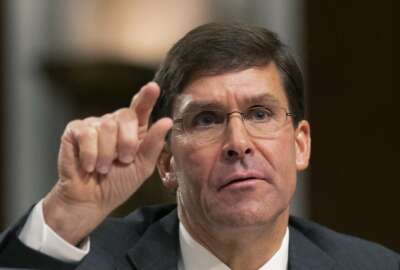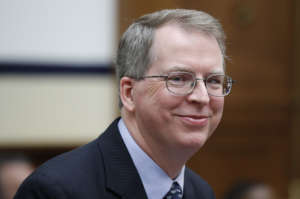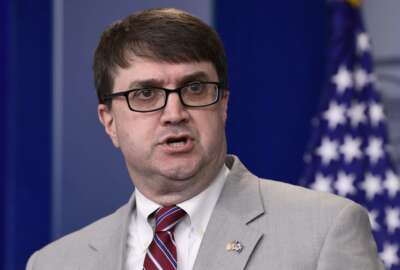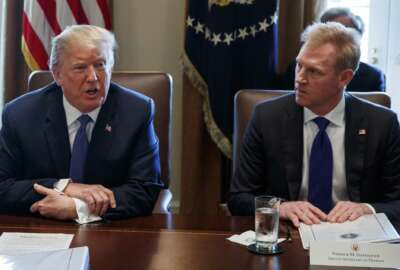
Esper, Norquist vow to fill Pentagon’s empty leadership positions
With a Defense secretary confirmed and a deputy secretary in the wings, Pentagon officials said they'll prioritize filling the rest of DoD's vacant political po...
President Donald Trump’s nominee to take the Pentagon’s second-ranking civilian position appeared to be on track to a trouble-free Senate approval after an uncontentious confirmation hearing on Wednesday.
David Norquist’s confirmation would mean the secretary of Defense and deputy secretary of Defense positions are filled by Senate-confirmed nominees for the first time since former Secretary James Mattis resigned at the beginning of the year. Mark Esper was sworn in as the new secretary on Tuesday.
But there are still more than a dozen political vacancies in the Defense Department, and senators continued to express their impatience at the Pentagon and White House’s pace toward filling those positions during Norquist’s confirmation hearing.

“We need confirmed leaders to guide the Department of Defense through the times of challenge and opportunity,” said Sen. James Inofe (R-Okla.), the chairman of the Senate Armed Services Committee. “There are still 18 vacant civilian positions that require action.”
And Sen. Angus King (I-Vt.) pressed Norquist, who has been performing the duties of the deputy secretary since January, for a clear road map on how DoD plans to fill the vacancies.
“I would hope that there would be a specific plan: ‘Here are these positions, we’re going to work with the White House,’ because it’s too important to not have the top leadership in place.”
Norquist insisted there is such a plan.
“Should I be confirmed, with Secretary Esper, putting the team in place as quickly and as early as possible so that you have them for the duration is absolutely essential,” he said. “There’s a list of the positions and there’s a list of the candidates and where they are in the process of either getting the background investigation, the clearance, the vetting. So that is underway. There are routine meetings on that to make sure that keeps moving.”
Although the president has already announced his intent to fill the positions of Secretary of the Air Force and Secretary of the Army — the job Esper just vacated — some of the other jobs have been empty for months, and in some cases, years.
Readiness, policy and other leadership gaps
Some of the largest gaps are in the Pentagon’s Personnel and Readiness office. DoD had a confirmed undersecretary for Personnel and Readiness for just seven months during the Trump Administration before Robert Wilkie left the department to become VA secretary. And two of the other four positions within P&R — principal deputy undersecretary and assistant secretary for health affairs — have been without a confirmed appointee since the beginning of the Trump presidency.
Related Stories

Wilkie’s nomination for VA secretary leaves giant hole in DoD’s personnel operation
DoD Reporter's Notebook
Read more
Related Stories

Wilkie’s nomination for VA secretary leaves giant hole in DoD’s personnel operation
DoD’s policy organization also contains notable gaps. David Trachtenberg, the principal deputy undersecretary for policy retired last week; a replacement has not yet been announced. Within that office, the jobs of assistant secretary for international security affairs and assistant secretary for special operations and low-intensity conflict are vacant as well.
Elsewhere in the Pentagon, the position of inspector general has been without a nominee for the duration of this presidential term. Other jobs being handled by temporary or acting officials are the director of cost assessment and program evaluation, assistant secretary for nuclear, chemical and biological defense; assistant secretary of the Navy for installations, energy and environment; and Navy general counsel.
The Pentagon’s third-highest ranking position — chief management officer — is also vacant for the time being, but the president nominated Lisa Hershman, the deputy CMO, to take the job earlier this month. She is still awaiting a confirmation hearing.
Speaking to reporters on Wednesday, Esper conceded the administration has work to do when it comes to filling the positions, but noted that most of them are at least temporarily being handled by acting officials.
“But when you look at the top six – of the top six, four of them aren’t occupied by a confirmed person, and that’s what concerns me,” he said. “We’ve got to get stable leadership in to make sure that you have that civilian control of the military, the right people in place leading this organization.”
Copyright © 2024 Federal News Network. All rights reserved. This website is not intended for users located within the European Economic Area.
Jared Serbu is deputy editor of Federal News Network and reports on the Defense Department’s contracting, legislative, workforce and IT issues.
Follow @jserbuWFED




